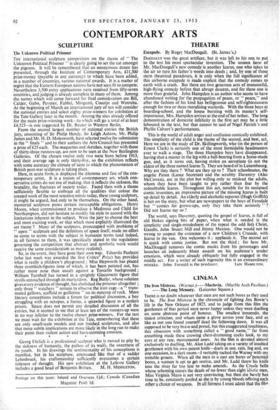THEATRE
Escapade. By Roger MacDougall. (St. James's.) DAEDALUS was the great artificer, but it was left to his son to put to the test his most spectacular invention. The unseen hero of Mr. MacDoupll's new comedy is another Icarus, one who takes to the air to turn his father's words into deeds • and, by one of those stern theatrical paradoxes, it is only when the full significance of this airborne escapade is made explicit that the comedy comes to earth with a crash. But there are two generous acts of resourceful, high-flying comedy before that abrupt descent, and for these one is more than grateful. John Hampden is an author who seems to have abandoned writing for the propagation of peace, or "peace," and after the fashion of his kind has belligerence and self-righteousness enough for two or three moralising warlords. With the three boys at boarding-school, and the house bursting with its master's self- importance, Mrs. Hampden arrives at the end of her tether. The long demonstration of domestic infelicity in the first act may be a little laboured in the text, but that cannot be said of Nigel Patrick's and Phyllis Calvert's performances.
This is the world of adult anger and confusion comically exhibited. The simplicity of the child is the theme of the second, and best, act. Here we are in the study of Dr. Skillingworth, who (in the person of Ernest Clark) is certainly one of the most formidable headmasters ever to walk a stage. The three Hampden boys have disappeared, having shot a master in the leg with a ball-bearing from a home-made gun, and, as it turns out, having stolen an aeroplane (is not the eldest of the three named Icarus ?). They are heard of in Luxembourg. Why are they there ? What are they up to ? Their schoolmates, the angelic Paton (Lance Secretan) and the scrubby Daventry (Alec McCowen), are in the plot but willing only to mislead the adults, whom they have been taught to pity rather than fear by the redoubtable Icarus. Throughout this act, notable for its sustained comic invention, an impressive picture of the missing Icarus is built up detail by detail. An elderly and alcoholic reporter. (Hugh Griffith) is hot on the story, but what are newspapers to the boys of Ferndale but "comics for grown-ups, only they take them seriously " ? Did not Icarus say so ?
The world, says Daventry, quoting the gospel of Icarus, is full of old blokes signing bits of paper, when what is needed is the simplicity and single-mindedness of (to repeat the odd list) Christ, Gandhi, John Stuart Mill and Jimmy Maxton. One would not be wrong to suspect the existence of a new Children's Crusade, with Icarus in the van. One welcomes it ; applauds it. The second act is quick with comic justice. But not the third ; for here Mr. MacDougall removes the comic masks from his personages and launches an indecently blunt assault on his audience's tender emotions, which were already obliquely but fully engaged in the middle act. For a writer of such ingenuity this is an extraordinary mistake. John Fernald is the producer. I AIN HAMILTON.


































 Previous page
Previous page